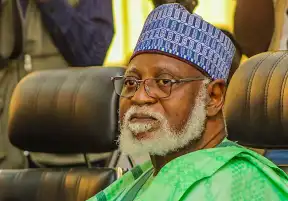
HOW I RECEIVED NEWS ABOUT ABACHA’S DEATH, BY ABDULSALAMI ABUBAKAR
Former Head of State, General Abdulsalami Abubakar, shared his recollections about the death of Nigeria’ s former dictator, General Sani Abacha, in 1998 and the subsequent events that followed.
Abubakar recounted that the news of Abacha’ s death was first brought to him by the then Inspector- General of Police, Ibrahim Coomassie.
Abubakar explained, ” General Abacha died on the day he was supposed to travel to Togo for an ECOWAS or AU summit.
” I received a call from the Villa that General Abacha wanted to see me. Initially, I thought he had changed his mind about the trip and was going to ask me to go in his place. At that time, I was effectively the second- in- command because General Diya and others were dealing with allegations of a coup. ”
He continued, “I was preparing to leave for the summit when I received another urgent call.
I quickly dressed in a tracksuit and headed to the Villa. To my surprise, I was asked to wait in the waiting room for over 30 minutes.
‘Eventually, Coomassie approached me and took me to the house, where he informed me that General Abacha had passed away during the night. “
Upon arriving at Abacha’ s residence, Abubakar saw the late General’ s body and offered prayers.
He then joined a gathering of officials, including Coomassie, the Chief Justice of the Federation, Ambassador Babagana Kingibe, and several security operatives, to discuss the next steps.
Abubakar emphasized the urgency of the situation, noting that the Chief Justice advised against leaving a power vacuum.
Thus, they quickly convened a Council of State meeting to appoint a new head of state before announcing Abacha’ s death to the public.
Abubakar described the intense period following Abacha’ s death, including his need to summon the military ruling council and prepare for the transition of power.
He remained in his tracksuit during the initial meetings due to the shock and urgency of the situation.
Once formally dressed, he rejoined the council members, who had by then arrived, to discuss the transition.
Ultimately, the council deliberated on who should succeed Abacha, considering the seniority of General Useini, then Minister of the Federal Capital Territory, and Abubakar himself, who was the Chief of Defence Staff.
The discussions highlighted the importance of maintaining stability and continuity in leadership during such a critical time for the nation.In conclusion, Abubakar’ s detailed account sheds light on the immediate actions and considerations taken by Nigeria’s leadership following the sudden death of General Abacha, emphasizing the complexities and challenges of navigating a smooth transition of power amidst a national crisis.
 Premium News
Premium News